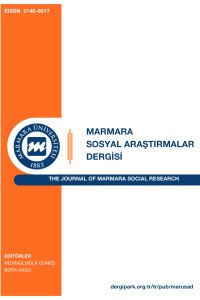İstanbul Metropolitan Yönetimi
Bu makale, İstanbul'un metropoliten gelişimini güncel ekonomik ve idari politikalar ışığında teorik perspektifte incelemektedir. Türkiye, ekonomik kriz karşısında yeniden yapılanma niyetiyle ilk etapta çalışmalara başlamış, ancak zamanla özel sektörün öncülüğünde oluşturulan politikalar siyasi kayırmacılıkla sonuçlanmıştır. Kaynakların yeniden tahsisi ve makro-ekonomik politikalardaki değişiklikler dönemin siyasi iktidarının tercihleri doğrultusunda muhafazakar burjuva sınıfından doğmuştur. Özetle neo-liberalizmin etkisiyle özel sektör Türkiye'de önemli bir paydaş haline gelmiş ve genel ekonomi politikasının oluşturulmasında ve yönlendirilmesinde oldukça etkili olmuştur.
Anahtar Kelimeler:
İstanbul, metropolitan governance, governance, İstanbul
Istanbul’s Metropolitan Growth Governance
This article examines Istanbul’s metropolitan development in the light of current economic and administrative policies in theoretical perspective. Turkey started to work initially, with the intention of restructuring in response to the economic crisis, but over time, under the guidance of the private sector, the policies created resulted in political favoritism. The re-allocation of resources and changes in macro-economic policies in line with the preferences of the political government of the time was born out of the conservative bourgeois class. In summary the effect of neo-liberalism, the private sector became an important stakeholder in Turkey, and has been quite effective in the general economic policy formulation and direction.
Keywords:
Istanbul’s Metropolitan Growth Governance, Istanbul, Governance,
___
- Andrew, C. and Goldsmith, M. (1998) “From Local Government to Local Governance and Beyond?” International Political Science Review, 19(2): 101–117.
- Avcı, Ö. and Özen, H. (2013) “Her Yer Taksim Her Yer Direniş: Kentsel Bir Hareketin Ulusal Yayılımı,” Atılım Sosyal Bilimler Dergisi, 3(1–2): 31–45.
- Baltacı, A. G. D. C. (2004) “Yeni Sağ Üzerine Bir Eleştiri,” Süleyman Demirel Üniversitesi İktisadi ve İdari Bilimler Fakültesi Dergisi, 9(2).
- Beauregard, R. A. and Bounds, A. (2000) “Urban Citizenship,” in E. F. Isin (ed.) Democracy, Citizenship and the Global City, London: Routledge: 243–256. Carley, M. (2000) “Urban Partnerships, Governance and the Regeneration of Britain’s Cities,” International Planning Studies, 5(3): 273–298.
- Cochrane, A. (1998) “Globalization, Fragmentation and Local Welfare Citizenship,” in J. Carter (ed.) Post-Modernity and the Fragmentation of Welfare, London/New York: Routledge: 252–266.
- Demirkaya, Y. (2006) “Küreselleşmenin Modern Yönetim Modelleri Üzerinde Etkisi: Avrupa Birliği’ne Adaylık Sürecinde Türkiye Örneği,” Journal of European Researchers, 14(2): 133–150.
- Demirkaya, Y. (2010) “Avrupa Birliği’nin Yerel Kamu Şirketleri Stratejisi: Türkiye’de Hukuki Yapı ve İstanbul Büyükşehir Belediyesi Uygulamaları,” Mustafa Kemal Üniversitesi Sosyal Bilimler Enstitüsü Dergisi, 7(13): 432–442.
- Demirkaya, Y. (2016) “Performance Management Experiences of Municipalities in Turkey,” in Y. Demirkaya (ed.) New Public Management in Turkey: Local Government Reform, London/New York: Routledge: 207–229.
- Eisinger, P. (1998) “City Politics in Era of Federal Devolution,” Urban Affairs Review, 33(3): 308–325.
- Erder, S. (2009) “Local Governance in İstanbul,” in R. Burdett (ed.) İstanbul City of Intersections, London: London School of Economics and Political Science: 46.
- Eren, V. and Kılıç, S. (2006) “Yerel Hizmetlerde Özelleştirmeye Alternatif Bir Yöntem Olarak Rekabet Yaklaşımı,” Ankara Üniversitesi SBF Dergisi, 61(3).
- İstanbul Metropolitan Municipality (2005) Küresel Bölgesel Gelişmeler ve Küresel Kent Stratejilerinin Araştırılması Raporu, prepared by Erkut, G., et al., İstanbul: İstanbul Metropolitan Municipality.
- İstanbul Metropolitan Municipality (2013), Annual Performance Report for 2012, İstanbul: İstanbul Metropolitan Municipality.
- İstanbul Sahipsiz Değil (n.d.) Website, available at: www.İstanbul sahipsizdegil.org (accessed January 9, 2018).
- Jacobs, B. D. (1992) Fractured Cities: Capitalism, Community and Empowerment in Britain and America, London/New York: Routledge. Kepenek, Y. and Yentürk, N. (2000) Türkiye Ekonomisi, İstanbul: Remzi Kitabevi.
- Kesfetmek Icin Bak (n.d.) Website, available at: http://www.kesfetmekicinbak.com/cevre-orgutlerinden-hes-fuarina-sert-tepki/3728n.aspx (accessed August 15, 2014).
- KONDA (2014), Yerel Seçimler Sonrası Sandık ve Seçmen Analizi, İstanbul, Turkey.
- Kuzey Ormanları Savunması (n.d.) Website, available at: https://kuzeyormanlari.wordpress.com/ (accessed January 9, 2018).
- Laclau, E. (2005) On Populist Reason, London: Verso.
- Lamba, M. (2015) “Türkiye’de Yeni Kamu Yönetimi Anlayışının Yansımaları: Hükümet Programları Üzerinden Nitel Bir İnceleme,” Süleyman Demirel Üniversitesi İktisadi ve İdari Bilimler Fakültesi Dergisi, 20(1).
- Marshall, T. (2000) “Urban Planning and Governance: Is there a Barcelona Model?” International Planning Studies, 5(3): 299–319.
- OECD (2008) OECD Territorial Reviews: İstanbul, Turkey, Paris: OECD.
- Ohmae, K. (2001) “How to Initiate Prosperity from the Global Economy into a Region,” in A. J. Scott (ed.) Global City-Regions: Trens, Theory and Policy, Oxford/New York: Oxford University Press: 33–43.
- Özen, S. (1993) “Political and Administrative Attitudes of Turkish Bureaucrats: An Explanatory Framework for change and stability,” Turkish Public Administration Annual, 17–19: 17–37.
- Özer, M. A. (2005) “Günümüzün Yükselen Değeri: Yeni Kamu Yönetimi”, Online Sayıştay Dergisi, 59.
- Ruppert, E. S. (2000) “Who Governs the Global City?” in E. F. Isin (ed.) Democracy, Citizenship and the Global City, London/New York: Routledge: 275–288.
- Scott, A. J., Agnew, J., Soja, E. W. and Storper, M. (2001) “Global City-Regions,” in A. J. Scott (ed.) Global City-Regions: Trends, Theory and Policy, Oxford/New York: Oxford University Press: 11–32.
- Sezen, S. (2002) “The Impact of Globalization on the Organization of Public Administration: Turkish Case,” Turkish Public Administration Annual, 27–28: 3–26.
- Sivil Toplum Geliştirme Merkezi (2015) “Mahalleye Hapsoldular,” available at: www.stgm.org.tr/tr/manset/detay/mahalleye-hapsoldular (accessed April 18, 2018).
- Tahincioğlu, A. N. Y. (2011) “Yazılı Basinda Özelleştirme Haberlerinin Sunuluşu: Tekel Eylemi Örneğinde Bir Karşilaştirma,” Atatürk İletişim Dergisi, 1(1).
- T.C. Çevre ve Şehircilik Bakanlığı (Ministry of Environment and City) (n.d.) “2015–2016 Yılı İmar Planları,” available at: http://mpgm.csb.gov.tr/2015-2016-yili-imar-planlari-i-5990 (accessed February 27, 2018).
- Teeple, G. (2000) “What is Globalization?” in S. McBride and J. Wiseman (eds.) Globalization and Its Discontents, London: MacMillan: 9–23.
- TUIK (n.d.) Website, available at: www.tuik.gov.tr/VeriBilgi.do (accessed August 8, 2014).
- UDHB (n.d.) Website, available at: www.udhb.gov.tr (accessed January 8, 2018).
- UIC (2013) “Test Runs begin for Marmaray Project,” UIC e-News, 361, 20 August 2013, available at: https://uic.org/com/uic-e-news/361/ (accessed February 27, 2018).
- Yayın Aralığı: Yılda 2 Sayı
- Başlangıç: 2011
- Yayıncı: Marmara Üniversitesi
